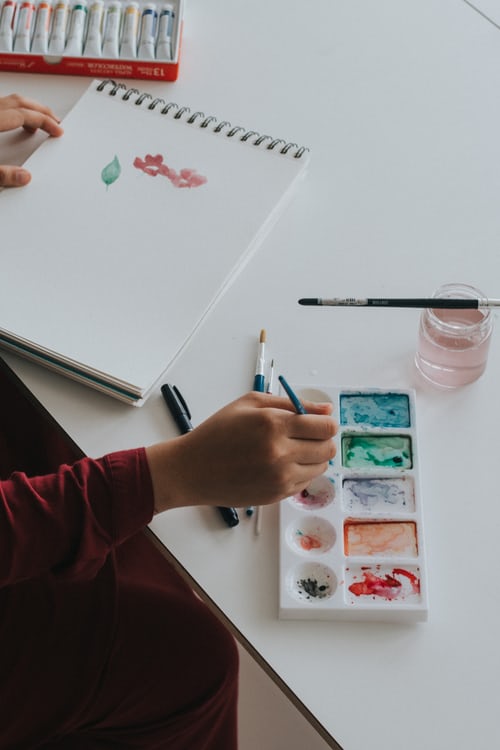I grew up surrounded by water. Literally. On a Pacific Ocean island on the most remote land mass on Earth.
Hawaii.
I could see the ocean from our home, and see the condominium pool from our kitchen window and front door.
To say I’m still suffering bodies-of-water withdrawal since our move to the desert Southwest 22 years ago would be an understatement.
BUT, praises of thankfulness, I have a pool in my backyard that I can see from the family room, laundry room and back bedroom, which we’ve set up as an office. Sometimes the pool water reflects off the family room ceiling, making soothing undulating patterns above my head. I’m grateful for these simple pleasures.
I spend a lot of my summer in that pool, but not nearly enough. Although I no longer have the luxury of spending hours playing and lapping in the pool as I did during my summer breaks while a kid, I can—and should—dive in and paddle around in order to improve my fitness level.
And it’s my humble opinion that swimming should be a go-to exercise for nearly everyone.
Swimming studies results—
A 2017 study reported by the Health Commission British Journal of Sports Medicine about the United Kingdom’s SWIM ENGLAND program showed significant results.
Some of the results:
- Swimming is uniquely placed to support people throughout their entire life.
- Swimming lowers the risk of early death by 28 per cent.
- Swimming and aquatic activity is a safe, cost effective and viable option for healthcare professionals to signpost (UK term for pointing the way, guiding or providing direction) patients.
- 47% had a lower risk of death due to heart disease or stroke.
Jane Nickerson, Swim England CEO, said,
“It’s evident from the report that swimming has enormous potential to support the health and wellbeing of the nation.”
With that kind of assessment, how long do you think it will be before the UK installs swimming as a mandatory activity for its school children? (While the United States is still cutting physical education and art due to budget concerns. Shortsighted, concerning the long-term health and financial benefits of lifelong exercise.)
Mike Farrar, Swim England Group Board Chairman and former CEO of the NHS Confederation, said,
“This report shows that activities like swimming really do have the potential to be a game-changer in supporting the health of this nation, especially at a time when cuts to services means less money for long-term care.”
According to the on-line blog article “The Health and Wellbeing Benefits of Swimming report was commissioned by the Swimming and Health Commission on behalf of Swim England to explore the impact of swimming on physical, mental and social wellbeing. It has been written by a range of eminent academics and is supported by the Chief Medical Officer, Professor Dame Sally Davies.”
They investigated several parameters and age groups and found that swimming:
- Helps those 3 months and over develop more quickly,
- Helps adults 18 and over reduce stress and overall health; and
- Helps those 65 and over live longer and stay mentally alert and physically agile.
More positive swimming research—
In a comparative study of middle distance runners’ lung function with that of swimmers, the researchers found that swimmers have better lung volume than the runners. The researchers hypothesized that the muscles active during breathing—like the diaphragm—are forced to work harder in swimming. The activity gave these trained swimmers more elasticity (stretchiness and ability to return to normal shape after being stretched) during breathing than did running.
My experience with swimming—
When I was eight years old, I had a brief stint with swim training at the YMCA. I loved being in the water and playing for hours in a pool, but when it came to practicing and swimming competitively, I couldn’t have been more bored, or probably out of my element.
While I quickly advanced from guppies to minnows, I hit a stalemate when they tried to advance me to shark (or barracuda, whatever it was). I couldn’t stand it. The swim instructor suggested to my mom that I might be happier in the gymnastics class.
Happy didn’t even begin to describe it!
My fast-twitch muscle fibers were born to perform explosive activities, and I quickly improved. While I could dash across a pool for short lengths and laps, long-distance, repetitive practices left me cold. No pun intended.
When I was in college, though, my best friend and I tore up the pool at the campus intercollegiate competition. Short distances, of course.
We were both former gymnasts. And I could do a mean flip turn and push off at the wall that got me out way ahead of the other competitors. (Sorry, I had to relive that victorious moment just once more!)
Benefits of swimming for all ages—
Now that I’ve hung up my leotards and really need a good, non-weight bearing activity to keep my muscles supple, my weight down, and my overloaded joints in shape, I’ve returned to the pool to add some crossover training variety to my life. There are great reasons for me to return to the pool—or for you to start getting into one if you haven’t already.
- Swimming can improve coordination. Coordinating your limbs to kick and stroke properly (without pounding or slapping the water and wasting energy) while breathing and not sucking in water is a feat for the uninitiated. Once learned, you’ll find yourself skimming through the water pretty effortlessly. And that effortless swimming helps:
- Lubricate your joints. In an era where too many people (I believe) undergo join replacements, or have to undergo the procedure, you swimming might just help you ward off that nasty surgery. When you’re exercising, the joint capsule fluid produces more joint-healing and cushioning fluid. And that benefits works in synergy with swimming’s ability to:
- Keep your joints flexible and reduce the onset of the effects of osteoarthritis. A lot of things can contribute to osteoarthritis, including: carrying around too much weight, eating foods that increase inflammation in the body, lack of exercise, over-exercising, and genes. But swimming is a non-weight bearing activity (unless you’re running in the shallow end of the pool) that reduces the load on your joints and gives them more space. And that gives your joints more:
- Flexibility! Always a good thing for older people that fall more frequently due to balance and flexibility issues.
Other swimming benefits include—
- Increased lung volume that aids lung capacity—(It’s a great activity for asthmatics.) With bigger lungs you have an increased area to fill up with O2 (oxygen). That means you’ll have more of that life-giving gas available to load up on cells to be conveyed deep into your body’s tissues. Everything works (and breathes) better.
- Some cross-training benefits—Intense swimming programs are found to equal intense sprint and explosive weight training programs.
- Lowering your stress levels— Tension and stress shorten your muscles, which leads to tightness and loss of joint range of motion. When we float around in a big cement pond full of water, our bodies naturally relax. Our breathing slows. (Of course, all of this is true if you know how to swim and like it.)
No wonder I feel so relaxed, almost sleepy, after I emerge from my swimming or floating sessions.
It’s cathartic, like praying and meditating. A great way to start or end the day!
Some good tools for swimming exercise—
I like to use a kick-board, the kind that swim teams use to have their kids work on their leg kicks. You can hang onto it and paddle along. Try not to keep your head above water for too long, though. You’re likely to get neck cramps and pinched nerves. I regular swim noodle works for this too.
I also like to use the training hand paddles to add resistance to my strokes. Two rubber loops slip over your fingers to keep the paddles in place. Don’t get the rubber too tight or you’ll find your finger circulation getting cut off.
And a good noodle is worth its weight in gold. You can use that for kicking, or for underwater cycling, if you don’t tread water well, or feel secure “running” in the deep end.
But beware: with any activity you can overdue it and end up with injuries. Competitive swimmers are notorious for having shoulder and back injuries, and it can be hard on your knees if you don’t kick properly. And you can get dehydrated in a pool just as you can on dry land, so make sure you drink plenty of water after your exercise, or during, if you swim long distances.
So don’t jump into the pool thinking this is an injury-free exercise. As with any other activity, get some training books, start slowly, train wisely, and work your way up.
And what about swimming and weight loss?
As with anything, you’re more likely to lose weight if your energy output exceeds your energy input. In other words, you eat less than you burn off. Swimming is no different, but fair warning: Swimming consistently in cold water can cause you to store fat, just like a polar bear in the arctic. Your body does whatever it can to survive. And swimming burns a ton of calories and increases your appetite. So, if you swim a lot and always chow down an excess portion of food afterward to curb your hunger, your weight may end up creeping up instead of going down.
My future swimming goals—
While we removed the heater capabilities from our pool and usually don’t get in it during the winter months (yes, it can get cold and snowy here), I’ve decided to brave up, purchase a short-leg wet suit, and hit the pool throughout the winter. I find it gives me so many benefits that I want to keep swimming year round and know I need to. I can also drive around the block to our community pool, which is a Junior Olympic size and has marked lanes.
The gym where we work out just moved into a grand new facility with a lap pool, but it isn’t open yet, and I’m going to guess it’ll be so packed that the only time I could get in would be between midnight and 5:00 AM. So I’m going to use my own cement pond. Might as well. I pay property taxes on it!
Even though we’ve had a blistering summer with little rain, it’s nearing the time that we’d normally cover the pool and say adios until next summer. But I’m determined.
Maybe I’ll take a picture of myself in my wetsuit and put it in a blog post. Or, maybe not. If I swim enough, I might actually look decent enough in it to share with you.
Now that’s motivation!
Until next week, check out some local pools, if you don’t have one in your backyard or community. Or locate a swim coach or club. Set some target goals, get some training material, and jump in.
Your body and mind will be happy you did.
Blessings,
Andrea
Andrea Arthur Owan is an award-winning inspirational writer, fitness pro and chaplain. She writes and works to help people live their best lives—physically, emotionally, and spiritually.





